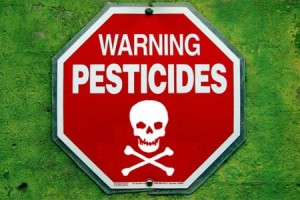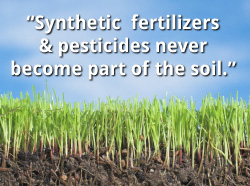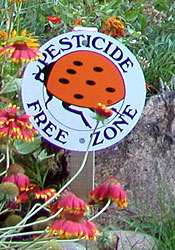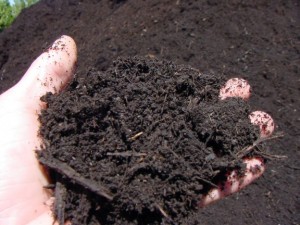What’s The Difference Between Organic And Natural Gardening?
“I believe everything grown Naturally is Organic, but not everything grown Organically is Natural.” ~ Eric Waggoner (Back To Natural)
Growing and producing fruits, vegetables, eggs, milk, meat, etc. organically is gaining more and more popularity every day…but what does organic mean? Here’s the definition of Organic Farming:
Organic farming is a form of agriculture that relies on techniques such as crop rotation, green manure, compost, and biological pest control. Depending on whose definition is used, organic farming uses fertilizers and pesticides (which include herbicides, insecticides and fungicides) if they are considered natural (such as bone meal from animals or pyrethrin from flowers), but it excludes or strictly limits the use of various methods (including synthetic petrochemical fertilizers and pesticides; plant growth regulators such as hormones; antibiotic use in livestock;genetically modified organisms; human sewage sludge; and nanomaterials.) for reasons including sustainability, openness, independence, health, and safety.[1]
[1] Wikipedia
Organic agricultural methods are internationally regulated and legally enforced by many nations, based in large part on the standards set by the International Federation  of Organic Agriculture Movements (IFOAM), an international umbrella organization for organic farming organizations established in 1972. IFOAM defines the overarching goal of organic farming as:
of Organic Agriculture Movements (IFOAM), an international umbrella organization for organic farming organizations established in 1972. IFOAM defines the overarching goal of organic farming as:
“Organic agriculture is a production system that sustains the health of soils, ecosystems and people. It relies on ecological processes, biodiversity and cycles adapted to local conditions, rather than the use of inputs with adverse effects. Organic agriculture combines tradition, innovation and science to benefit the shared environment and promote fair relationships and a good quality of life for all involved…”
By definition, Organic Farming uses fertilizers and pesticides, herbicides, insecticides and fungicides as long as they are considered natural. That’s good, but just because something is derived from other plants and animals, does that make it safe? No, not necessarily. In most cases this is true, but not always. Plus there are some synthetic chemicals that have been approved for organic farming.
“The assumption, of course, is that these natural pesticides are safer than the synthetic ones. Many of them are, but there are some notable exceptions. Rotenone, a pesticide allowed in organic farming, is far more toxic by weight than many synthetic pesticides. The U.S Environmental Protection Agency sets exposure limits for the amount of a chemical that individuals (including kids) can be exposed to per day without any adverse effects. For Rotenone, the EPA has determined that people should be exposed to no more than 0.004 milligrams per kilogram of body weight per day. Let’s compare this toxicity to that of some commonly used synthetic pesticides, like the organophosphate pesticide Malathion. The nonprofit Pesticide Action Network calls organophosphates “some of the most common and most toxic insecticides used today.” (Sarin, the nerve gas used in two Japanese terrorist attacks in the 1990s, is a potent organophosphate.) Yet the EPA has deemed it safe, based on animal tests, for humans to be exposed to 0.02 milligrams of Malathion per kilogram of body weight per day. This is five times more than the amount deemed safe for Rotenone. In other words, by weight, the natural pesticide Rotenone is considered five times more harmful than synthetic pesticide Malathion. The EPA’s recommended exposure limit for Glyphosate, another widely used synthetic pesticide—you might know it as Roundup—is 0.1 milligrams per kilogram per day, which means it’s 25 timesless toxic by weight than Rotenone. The synthetic pesticide Captan is 32.5 times less toxic than Rotenone, and another one, Pyrimethanil, is 42.5 times less toxic than Rotenone. Rotenone is also not the only natural pesticide that out-ranks synthetic pesticides in terms of toxicity. The pyrethrins, a class of pesticides derived from chrysanthemums that are approved for use in organic farming, are more toxic by weight than Roundup, Captan, and Pyrimethanil, too.”[2]
[2] From Organic Shmorganic (Organic vs. Conventional Produce For Kids)By Melinda Wenner Moyer
The definition of Natural Farming differs from Organic Farming. Natural farming is defined like this:
Natural farming is an ecological farming approach established by Masanobu Fukuoka (1913–2008), a Japanese farmer and philosopher who described his way of  farming as 自然農法 (shizen nōhō) in Japanese.[1] It is also referred to as “the Fukuoka Method”, “the natural way of farming” or “do-nothing farming”. The title refers not to lack of labor, but to the avoidance of manufactured inputs and equipment. Natural farming can also be described as ecological farming and is related to fertility farming, organic farming, sustainable agriculture, agroforestry,ecoagriculture and permaculture but should be distinguished from biodynamic agriculture.
farming as 自然農法 (shizen nōhō) in Japanese.[1] It is also referred to as “the Fukuoka Method”, “the natural way of farming” or “do-nothing farming”. The title refers not to lack of labor, but to the avoidance of manufactured inputs and equipment. Natural farming can also be described as ecological farming and is related to fertility farming, organic farming, sustainable agriculture, agroforestry,ecoagriculture and permaculture but should be distinguished from biodynamic agriculture.
The system exploits the complexity of living organisms that shape each particular ecosystem. Fukuoka saw farming not just as a means of producing food but as an aesthetic or spiritual approach to life, the ultimate goal of which was, “the cultivation and perfection of human beings”. He suggested that farmers could benefit from closely observing local conditions. Natural farming is a closed system, one that demands no inputs and mimics nature.
closely observing local conditions. Natural farming is a closed system, one that demands no inputs and mimics nature.
Fukuoka’s ideas challenged conventions that are core to modern agro-industries, instead promoting an environmental approach. Natural farming also differs from conventional organic farming, which Fukuoka considered to be another modern technique that disturbs nature.
Fukuoka claimed that his approach prevents water pollution, biodiversity loss and soil erosion while still providing ample amounts of food.[3]
[3] Wikipedia
So you see, just by definition I believe ALL Natural Farming is Organic, but NOT ALL Organic Farming is Natural. I believe we need to get Back To Natural! I believe we need to use ZERO chemicals, ZERO GMO seeds & plants, ZERO steroids in our animals, etc. There was a time when none of these things were even available to use if we wanted to. So that means it was possible to produce fresh fruits and vegetables, fresh eggs, fresh milk and dairy products and fresh meat without using any chemicals, fertilizers, steroids at all. It is possible for us to build up the soil AND produce quality all natural produce at the same time. We need to compost, there should not be ANY “waste” coming out of our gardens…everything gets eaten or recycled. The Earth was created to provide for us, we need to treat it with respect and care for it in a way that protects it and recharges it. If we continue to deplete the soil without putting any work into replenishing it, at some point, we will no longer be able to produce crops for ourselves.
I’m not trying to scare anyone and I am not some kind of doomsday guy, but facts are facts. Our food is not as nutritional as it was just 50 years ago! 90% of Americans are not getting the nutrients we need in our diets. A 2004 study of 43 crops showed a decline in the nutrient content of up to 38% over the past 50 years.*
How do we fix this? We need to replenish the soil to start with. If the soil has no nutrients in it for the plants to soak up, how can the plants produce fruits and vegetables that are packed with nutrients? We’re losing tons of top soil per acre, per year. We have got to protect our soil. How do we do that? No till farming is one way…that would work easier on a larger scale. On a small scale, we should also not till. The ground needs a cover. So mulch, compost, ground cover crops…these are a few ideas.
that are packed with nutrients? We’re losing tons of top soil per acre, per year. We have got to protect our soil. How do we do that? No till farming is one way…that would work easier on a larger scale. On a small scale, we should also not till. The ground needs a cover. So mulch, compost, ground cover crops…these are a few ideas.
* reference Journal of American College of Nutrition Vol. 23(6); 2004: 669-682